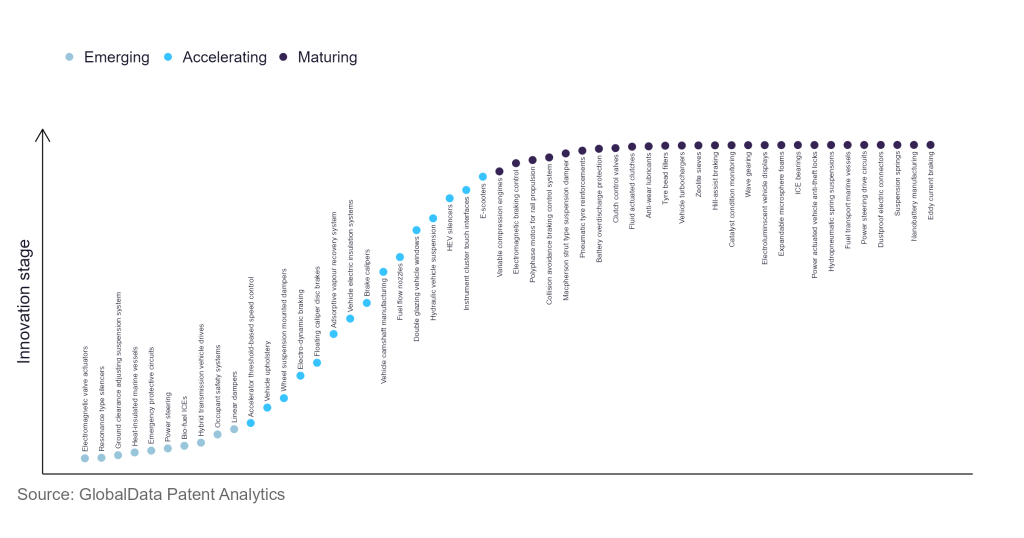The automotive industry continues to be a hotbed of innovation, with activity driven by the need to safely transfer fluids in new technology, and growing importance of technologies such as fuel cell vehicles, connected and autonomous vehicles. In the last three years alone, there have been over 1.2 million patents filed and granted in the automotive industry, according to GlobalData’s report on Innovation in Automotive: Fuel cell heat exchangers. Buy the report here.

Discover B2B Marketing That Performs
Combine business intelligence and editorial excellence to reach engaged professionals across 36 leading media platforms.
However, not all innovations are equal and nor do they follow a constant upward trend. Instead, their evolution takes the form of an S-shaped curve that reflects their typical lifecycle from early emergence to accelerating adoption, before finally stabilising and reaching maturity.
Identifying where a particular innovation is on this journey, especially those that are in the emerging and accelerating stages, is essential for understanding their current level of adoption and the likely future trajectory and impact they will have.
290+ innovations will shape the automotive industry
According to GlobalData’s Technology Foresights, which plots the S-curve for the automotive industry using innovation intensity models built on over 619,000 patents, there are 290+ innovation areas that will shape the future of the industry.
Within the emerging innovation stage, resilient spoke wheels, auto-transmission lubrication circuits, and ignition switching engines are disruptive technologies that are in the early stages of application and should be tracked closely. Engine purge actuators, electro-dynamic braking, and adsorptive vapour recovery system estimation are some of the accelerating innovation areas, where adoption has been steadily increasing. Among maturing innovation areas are collision avoidance braking control system and direct injection type engines, which are now well established in the industry.
Innovation S-curve for the automotive industry

Fuel cell heat exchangers is a key innovation area in automotive
Fuel cell systems must have heat exchangers to perform thermal management tasks such as heating incoming gas streams, transferring heat from different flow streams, and maintaining temperature uniformity. A fuel cell heat exchanger needs to be safe to use with corrosive fluids and gases at high temperatures. A stainless-steel tube fin heat exchanger is used to design and manufacture a heat exchanger that can withstand such conditions.
GlobalData’s analysis also uncovers the companies at the forefront of each innovation area and assesses the potential reach and impact of their patenting activity across different applications and geographies. According to GlobalData, there are 40 companies, spanning technology vendors, established automotive companies, and up-and-coming start-ups engaged in the development and application of fuel cell heat exchangers.
Key players in fuel cell heat exchangers – a disruptive innovation in the automotive industry
‘Application diversity’ measures the number of different applications identified for each relevant patent and broadly splits companies into either ‘niche’ or ‘diversified’ innovators.
‘Geographic reach’ refers to the number of different countries each relevant patent is registered in and reflects the breadth of geographic application intended, ranging from ‘global’ to ‘local’.
Valeo is one of the leading innovators in fuel cell heat exchangers. The company has developed cladding an aluminium-silicon alloy with a brazing sheet that provides the alloy with the thin walls required for use in automobile heat exchangers, as well as such desirable characteristics as high strength, corrosion resistance, and formability. Other companies innovating in this technology domain are Denso, Mahle and Kia.
To further understand the key themes and technologies disrupting the automotive industry, access GlobalData’s latest thematic research report on Automotive.
Data Insights
From

The gold standard of business intelligence.
Blending expert knowledge with cutting-edge technology, GlobalData’s unrivalled proprietary data will enable you to decode what’s happening in your market. You can make better informed decisions and gain a future-proof advantage over your competitors.






